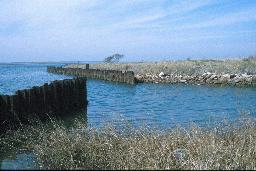Environmental Sustainability Report
TIME-LIMITED ENVIRONMENTAL SUSTAINABILITY PROJECTS
Project Title: Wetland Enhancement and Restoration Demonstration Project
Agency: North Carolina Maritime Museum
Project Implementation & Completion Dates: March 1999 - Spring 2001
Project Description: The Wetland Restoration Program in partnership with
other groups undertook a wetland enhancement and restoration demonstration project at
the 36-acre future expansion site for the North Carolina Maritime Museum.
The cooperating groups include
Waterfront property was acquired by the North Carolina Maritime Museum's support group, Friends of the Museum, for the purpose of museum expansion. The site housed a former menhaden fishmeal factory. Closed for over thirty years it consisted of eroding shoreline, a failing sheet pile bulkhead, and on-site opportunities for wetlands restoration and enhancement.
A water quality management plan, in cooperation with the North Carolina Coastal Federation was developed to be incorporated into a site plan development process. A portion of this plan focuses on a design for shoreline erosion control, coastal wetland protection, and wetland enhancement. This involves the following:
Sections of the shoreline will serve as shoreline stabilization demonstration areas.
A low sill, with minimal backfill and planting with coastal marsh, and a small revetment in front of the failing bulkhead will provide protection of current marsh. This will establish a marsh fringe and maintain a headland feature already present that will allow interaction of estuarine organisms with the protected marsh fringe.
Low profile stone breakwaters will provide stabilization of a slowly eroding shoreline. This will also allow existing marsh to migrate seaward, increase in size, and provide more protection to the upland region.
Part of an existing dredge spoil stockpile area will be removed and coastal marsh restored. This will increase coastal marsh, enhance water quality entering the estuary from upland drainage, and serve as a demonstration of best management practices for stormwater runoff.
Project status as of April 2000:
The grasses planted last June may have to be replanted because of the hurricanes. A plan to construct a shoreline sill and plant more grasses behind it is the next option. The North Carolina Coastal Federation designed a plan for shoreline stabilization, it has been approved, and permits have been written. Project plans have gone out for bids from the on-site consultant and a contractor. The demonstration project, once completed, will illustrate how to develop coastal land in an environmentally responsible manner.
Contact: Dr. George W. Shannon Jr. , Director,
North Carolina Maritime Museum,
Division of Archives and History, (252) 728-7317.
Actions necessary for implementation:
Anticipated Environmental Sustainability Benefits:
This project will protect museum property, increase coastal marshlands, and demonstrate to the general public how shorelines can be stabilized by reestablishing salt marsh and enhancing the health and protection of the estuarine environment. Those who visit this site will be able to enjoy North Carolina's coastal heritage and natural
environnment well into the future.
Project 2

 Protection of natural estuarine habitat including eroding salt marshes and degraded
freshwater wetlands
Protection of natural estuarine habitat including eroding salt marshes and degraded
freshwater wetlands
| DCR Report Home Page |
Recycling |
Electronic Communication |
Landscape Management |
| Tax Credit Programs |
Electronic Scheduling |
Tryon Palace Project |
Maritime Museum Project |